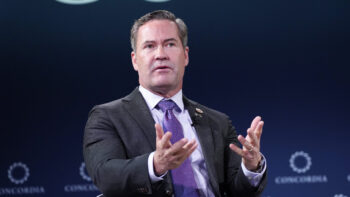
One of the most powerful Democrats in the Senate blamed the Republican-controlled House of Representatives for Washington’s inability to fix the automatic budget cuts known as sequestration.
“They assume sequester is the new normal,” said Sen. Barbara Mikulski, chair of the almost all-powerful Senate Appropriations Committee, sitting in on a meeting of SAC’s defense subcommittee this morning. “I don’t do that….They took all of their cuts in domestic discretionary [spending]; they had a moat around Defense, so it’s not equal.”
Mikulski was referring to the House-passed 2014 budget, which slashed non-defense spending to meet sequestration targets, an aide clarified.
But the House and Senate budget resolutions are mostly political gestures; it’s the annual appropriations bills (and to a lesser degree the authorization bills) that determine what the government actually spends. And House appropriators, of course, are quick to deny that they’d given up on stopping sequester.
“The House Appropriations DoD bill specifically does not abide by the Defense sequester caps for fiscal year 2014,” wrote committee spokesperson Jennifer Hing in an email sent just five minutes after we sent her Mikulski’s quote. The House-passed appropriations act “provid[es] ing $512.5 billion in regular discretionary funding in the bill. Under the FY14 sequester cap, this same bill total would be approximately $468 billion” – i.e. $44.5 billion over what sequestration would allow. “Clearly the Committee’s position is not in favor of the sequester.”
Of course, unless the two parties can agree to amend or repeal the Budget Control Act of 2011, all the spending levels they legislate for 2014 will automatically be slashed until they fit the sequester caps.
The exchange shows just how ritualized – and sterile – the debate over sequestration has become. Mikulski spoke at a pro forma session of SAC-D to “mark up” the defense appropriations bill, at which all amendments, debates, and other substantive work were deferred to Thursday’s full-committee meeting. Instead, the legislators spent their time lauding their favorite portions of the bill, congratulating one another for their good work, and – in a post-2011 to the traditional congressional time-fillers – denouncing sequestration:
“We can’t continue like this,” lamented SAC-D Chairman Richard Durbin in his opening statement.
“We all want to fix the sequester,” agreed Dan Coats, a Republican.
“We have to find a way to cancel sequester,” said Mikulski. “I’m for a grand bargain,” she added, but it has to be “quick.”
What that bargain might be, however, seems to elude all legislators on both sides. Saying we have to stop sequestration has become a part of the congressional routine. Actually finding a way to stop sequestration is another matter.
Navy asking Congress for $5.7B in emergency submarine funding
Most of the money would shore up buys for three Virginia-class subs, while some funding would go to help industry improve its productivity.



























